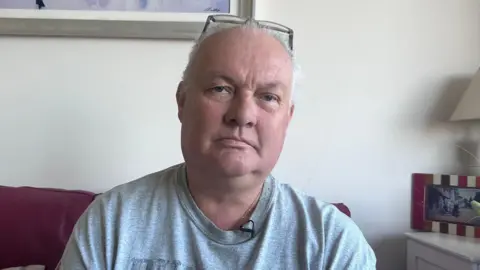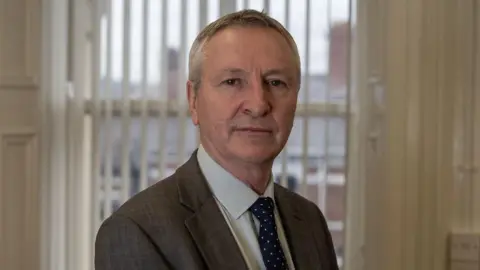More support needed for jurors after 'traumatising' trials
 BBC
BBCA man who served on the jury of a high-profile murder trial has said more needs to be done to support jurors who are exposed to disturbing, graphic evidence.
"The judge told us what the charges were, and it was just gasps, abject horror. I'd never seen that level of violence before," Lee Thompson told BBC News NI.
Sitting through two months of evidence, including body-worn camera footage of the immediate aftermath of the scene in which a young child had been killed, left him struggling with post traumatic stress disorder (PTSD).
The Northern Ireland Courts and Tribunals Service (NICTS) said jurors are offered counselling in the aftermath of trials.
They are also signposted to additional NHS services, if needed, it added.
Mr Thompson said he and the other jurors were "just ordinary people pulled off the street", adding that he was not prepared for the graphic nature of the evidence he would be exposed to.
Police officers often use body-worn cameras to capture footage as part of evidence-gathering measures and this can be used in court during trials.
"I think the worst for me was seeing the PSNI [officer] frantic, trying to save the life of the child, and the reaction of the paramedics," said Mr Thompson.
What support was provided to jurors?
Information on how to access free counselling services was handed out to jurors following the guilty verdict, but at the time he didn't feel he needed the help.
He told BBC News NI that he expected life to return to normal, but a few months later he began to have nightmares and flashbacks about the murder scene.
"I found myself becoming irritable, isolated. Bad, bad moods. I was just in a dark place," he said.
He eventually reached out to the counselling service paid for by NICTS, but said the six telephone sessions were not enough.
"I started to relapse, and the old stuff came back. The panic attacks, flashbacks," he added.
"I was in a clothes shop with my wife, and I was just standing in the doorway in the sunshine, and then this little boy took my hand, a little two-year-old, and that totally freaked me out."
 Getty Images
Getty ImagesWhat is PTSD?
In September 2024, Mr Thompson was officially diagnosed as having PTSD.
"I never thought in a million years I'd get PTSD because you only think it's the soldiers and that.
"It's a horrible affliction when it gets hold of you."
The NHS describes PTSD as a mental health condition caused by very stressful, frightening or distressing events.
How many jurors avail of counselling services?
An NICTS spokesperson said jury service is an essential part of the justice process.
They acknowledged it can lead to people being exposed to evidence which may be "challenging in nature", and said the current service allows jurors the opportunity to talk through their experience with counsellors.
The statement added: "Jurors who require additional counselling will be signposted to appropriate services, such as those provided by the NHS."
BBC News NI has found that only 14 people have used the service since January 2024.
Body-worn cameras
Dr Michael Duffy, a cognitive psychotherapist and expert in PTSD from Queen's University Belfast, said Mr Thompson's experience is not uncommon.
"There is this concept of vicarious trauma where people who are not directly exposed to a trauma but are indirectly exposed to it via looking at images etc, develop PSTD."
Dr Duffy said the increasing use of body-worn camera evidence in courts could be causing more mental health issues among people exposed to the footage.
"It's a difficult problem to solve because obviously the role of a juror is that they must see the evidence and that can have a profound effect on determining innocence or guilt.
"We have to consider the impact it has on members of the jury, and I think the court system needs to take in consideration how they select jurors.
"For example, one factor related to jurors developing PTSD is a prior trauma experience on their own part, so maybe we need to screen out certain people on certain cases."

Dr Duffy said jurors also need more support during trials as they are unable to discuss the case with family or friends, which can lead to feelings of isolation.
"We have to assist them to cope with what they're being exposed to", he said.
Mr Thompson eventually paid hundreds of pounds for specialist counselling for his PTSD.
He said it has helped him, but the journey to get that help has taken its toll on his life, his relationships, and his physical and mental health.
He thinks there should be more support available for jurors like him.
"It should be an ongoing process until you feel that you don't need it, and I think it should be in person.
"A phone call is all right, but when you actually sit down with somebody that is trained to deal with these situations… it's so much better."
